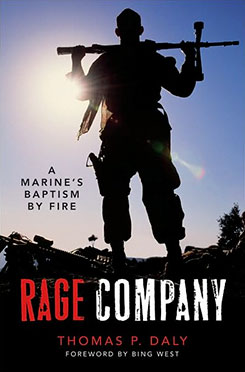Alumni Gazette

Seven minutes into our first patrol in Ramadi, the point man was shot in the throat. The wounded Marine apologized to his lieutenant for getting hit. Then he went unconscious.
Another day at war, another firefight, another casualty. After the confusion and chaos of our brush with combat, I couldn't stop wondering: What did this Marine’s sacrifice accomplish? We didn’t kill or detain any al Qaeda operatives. We didn’t discover any hidden weapons caches. Ramadi didn’t feel any safer because of our presence. So what was the point? In past wars, the answer to “Why do you, or we, fight?” was easy. In World War II, the attack on Pearl Harbor, and the Nazis’ expansion, provided a call to action. Today, it isn’t so clear.
Throughout Iraq and Afghanistan, the nature of each traumatic injury or death may be different, but the question of “why” that follows is still the same. To ignore the why erodes the basic principle that provides what every combatant needs to fight: the reassurance that the cause is worthy of the ultimate sacrifice. Once this basic principle is no longer true, soldiers and Marines fight for self-preservation, and each other, not a heroic cause or just peace, as politicians might like to think.
In Ramadi, our lives were reduced to a collection of missions, during which we tried to identify and kill an unseen enemy before he could do the same to us. We weren’t fighting for any noble objective, or to protect the U.S. from weapons of mass destruction. We were fighting for survival.
Then, halfway through the deployment, in the vast farmland east of Ramadi, an answer came. In January of 2007 an Iraqi citizen militia approached my unit, wanting to help us defeat al Qaeda. In the series of pinpoint raids that followed, I realized that I wasn’t fighting for America. I was fighting for the Iraqi people. The more I interacted with the militia, understood their suffering, the more I became convinced in their cause against al Qaeda. The brutal murder of a father while his wife and young children were forced to watch and the placement of children’s heads in baskets because their “tribe” was not fighting the Americans were no longer statistics. They knew the hard reality of life under brutal terrorists. Their pain was real. And because of that reality, the fathers, sons, mothers and daughters that made up the militia became my, and America’s, greatest opportunity. They revealed to me my unseen enemy. Al Qaeda was no longer a shadow in the dark. My unit now had a purpose. Our war finally had meaning.
We conducted raids with former insurgents, men who were once our enemy but had switched sides. We adapted to an unconventional style of warfare, which resulted in the capture and killing of dozens of militants, including the second highest-ranking insurgent in Anbar province. Most important, our actions directly contributed to what came to be known as the “Anbar Awakening”—the uprising of thousands of Anbari tribesmen against al Qaeda. That, in turn, led to the collapse of the terror network in cities like Fallujah, Haditha and Ramadi.
This was why we fought. Not for the reasons politicians championed from behind lecterns hundreds of miles away. We fought for the Iraqis. So they could live free from terror.
When the president and other elected officials send soldiers and Marines into battle, they know they’ll go willingly, at a moment’s notice, without questioning why. Eventually, though, that question will bubble up to the surface. It took me six months to figure it out.
I’m glad I did. Because you never want to be a looking at the body of a fallen comrade, searching for the meaning of his sacrifice.
A version of this essay appeared originally in the Washington Post blog, Impact of War, http://voices.washingtonpost.com/impact-of-war/. Reprinted with permission.

